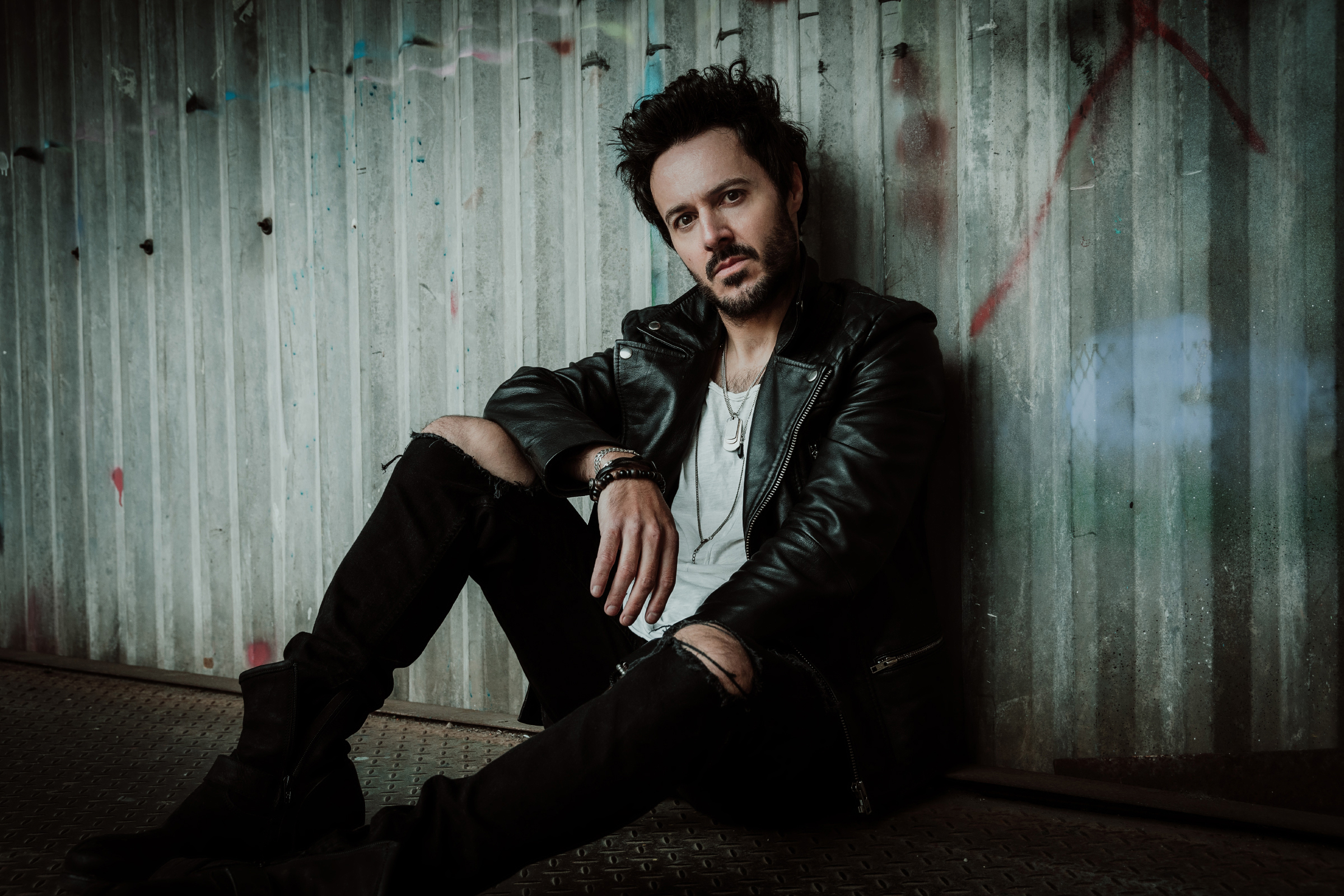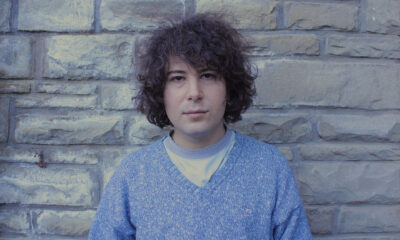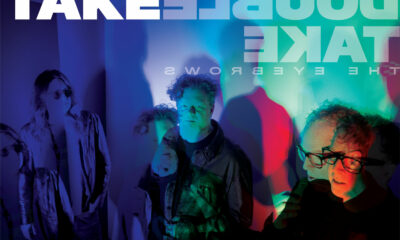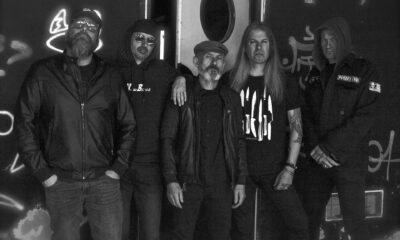Alternative/Rock
Rock N’ Roll Underdog James Kennedy Delves into the Darker Side of Life as a Rockstar
Life as a rockstar isn’t always private planes and expensive hotels as we found out when we spoke to former Kyshera frontman James Kennedy, a man who has exprienced the darker side of rock stardom.

When most of us start a band, we dream of being the next Metallica or Iron Maiden, touring the world in private planes and playing to sold-out stadiums the world over. Sadly, for most groups, the reality involves playing to half-full dive bars and touring around in a clapped-out minibus.
One person that has lived through that and is still here to tell the tale is Welsh rocker and former Kyshera frontman James Kennedy who documented his experiences (both good and bad) in his new book Noise Damage: My Life As A Rock’n’Roll Underdog. The book is out now (and you can read our review here), so, once you’ve read that, grab a copy here if you want insight into the darker side of the rockstar lifestyle.
This all said, we recently spoke to James about the book, his experiences, and the advice he would pass on to all budding rockstars out there.
Thanks for your time James, how does it feel now the book Noise Damage: My Life As A Rock’n’Roll Underdog is finally out?
James Kennedy: “It’s strange! A book takes a lot longer to bring to life than an album so I’ve lived with it for about a year since writing it last year and now that I’m finally setting it free, it feels a little odd. Especially given that people will now be reading the sordid secrets of my life!”
For anyone who likes reading a good rock n’ roll book, what will they get from picking it up?
“Hopefully they’ll get an insight into a side of the music world they’ve never had before. Everyone’s read the usual rock memoir books about stadium tours, drugs, trashing hotel rooms, and groupies, the excessive lifestyles of the exceedingly lucky. But no one’s ever told the story about the rest of us. All those millions of musicians and bands plugging away every night, up and down the country, playing in half-empty dive bars on a Tuesday night. Those bands who work just as hard and write music just as awesome but for reasons explained in the book, never get their break.
Noise Damage takes you on a journey from the first strum of the guitar to the first gig and touring internationally, to getting ripped off by dodgy labels, too many near misses, addiction, mental health, and way too many hangovers. It’s still very rock n’ roll but instead of trashing hotel rooms, we trash the inside of a transit van. It’s all 100 percent true and shines a light on the industry that many music fans probably don’t know about.”
How did the idea come about and how did it come together?
“I never really set out to write a book and it was never something that I ever dreamed of doing. But it came together incredibly fast when it did. I wrote the whole book in about three months. I think when the band (Kyshera) broke up in December 2018, I had a lot of mixed emotions looking back at our turbulent history, a history I’d spent over a decade living. During our rise and fall we’d had the crash and complete transformation of the music industry and I felt that I’d lived, worked and struggled through an interesting time in our industry’s evolution. I also had tons of juicy road tales and industry scumbags to name and shame and I just thought ‘why is it that only the top one percent of megastars get to tell their story? What about the rest of us!’ So I think a large part of it was me wanting to make sense of some things for myself now that it was all over. But I never thought it would turn into a book and I NEVER thought it would get published! I wouldn’t have been so brutally honest if I’d known that!”

Artwork for ‘Noise Damage’ by James Kennedy
What was it like revisiting those days and were there any stories that you uncovered that you’d forgotten about?
“It was very bittersweet. The band didn’t end on great terms so I was looking back at all of these amazing memories with a little bit of a bitter taste in my mouth. There were so many ups and downs during our relatively short life as a band that it was just a real emotional cocktail revisiting it all, total nostalgia mixed with sadness and anger and even a slight sense of injustice, but writing the book really helped me to make sense of it all and share our story. There were so many things I’d forgotten about too! I went back through all of my emails and social accounts looking for things that would fill in the blanks and there were some real gems that I’d forgotten about (usually because of alcohol) like the time I tried to pay for a sandwich in a petrol station with a bag of Ketamine.”
You wanted to be a rock star since you were nine years old. Who was the one rock star you really looked up to?
“I think the first guy that blew my head off was Steve Vai. Obviously, as a young guitarist, Jimi Hendrix was God and I taught myself by learning his songs, but he was from an era that was before my time so I remember the moment I saw Vai on a grainy VHS playing ‘For The Love of God’ and my world changed instantly. I’m still a huge Vai fan although I long ago gave up any idea of being able to play like him (laughs).”
You’ve written the book from a different angle where life on the road isn’t always glamorous, what did you learn about yourself and the music industry from those times?
“I think that it is a struggle where we learn the true nature of ourselves and others. As the book says, being a winner is easy, it’s being a failure that’s hard and my relentless pursuit of rock stardom taught me so many things because if at any time something stood in my way (internal or external) I’d find a way to deal with it because the band was always more important. That meant overcoming nerves, anxiety, shyness, weakness, demons, and developing a ton of new skills as our money dwindled ever downward like production, graphic design, and setting up my own label. So I think the main thing I learned is that it’s important to have a goal, a dream, a destination, or whatever you want to call it. It’s important to have something that means more to you than the fear of the obstacles in your way.
Chasing rock stardom transformed me a person, not by success but by the sheer bloody battle of it all and I’m really glad it did. What I learned about the industry is that it is completely incompetent with a very dubious business model and is mostly still run by a small clique of insiders the way it always was. My book is about all the people trapped outside the cool club.”
What advice would you give a new band, under normal circumstances, that are starting to make headway into this industry?
“Read my book (laughs)! I would say that finding the right label is still really important but that you should do as much as you can for yourself, for as long as possible before signing with a label. And luckily the tools exist these days to do just that. You can make your own records, put them out there, promote yourselves and build a fanbase without ever needing a label and that puts you in a stronger position. Most bands that get signed to a major label get dropped but if you’ve got your own audience, nothing can stop you. Your fans are everything. Make your fans the priority and the labels will come soon enough.”
You must have a favourite story or moment from your life as a rock star?
“My fondest memories are still Kyshera’s trips to Toronto. Even though we were staying at ‘Canada’s Number 1 Award-Winning Hostel’ (you’ll have to read the book!), we always ended up in daft situations there like nearly freezing to death in my pants on the top of an apartment block in winter or going to church dressed like the Village People. We developed an affinity for the city, had friends there, and knew our way around so doing shows there were often an excuse to go partying (laughs).”
What about low points? Was there a time when you thought why am I doing this? How did you get through those times?
“Tons of times! I think that feeling really hit hard though on our final tour in Europe. That tour was such a torrent of bad luck, bullshit and ball ache that it did actually seem like the Gods had a personal issue with us. It had been creeping for a while but that tour was the final thread that put me into a quite a heavy depression that lasted many months. In the past, I would always be able to get through the tough times by keeping focused on the prize of eventual rock stardom (or getting drunk) but after that tour, it had become painfully obvious that it was time to stop and re-evaluate some things in my life.”
What about favourite towns, cities and venues to play? Where do you look forward to going to in particular?
“Well, apart from Toronto I love playing in London (the original one) or up north where the people are crazier! My favourite UK venue is Nottingham Rock City, many, many good times have been had there! But I’ve got very fond memories of The Borderline (RIP), Bannermans in Edinburgh and Craufurd Arms in Milton Keynes. Oh and Schuur in Switzerland is spectacular.”
And who would be your ultimate tour?
“I think touring with Billy Talent would be fun! They seem like cool guys, I like the band and I then could steal Ian D’sas guitar tone secrets…”
It’s hard not to talk about touring and music without talking about the state of the industry in 2020, what are your thoughts on the state of music given the lockdown and how will it look when it comes out of the other side?
“It’s pretty damn grim, isn’t it. So many of my peers are just physically unable to work and I think the effects of this on the industry and the lives of so many artists is going to be felt for a very long time. But I think it’s important to remember that COVID hasn’t killed the music industry, the industry was on its knees already. Venue closures, the music press shutting shop, streaming, it’s been dire for quite some time and I think that ultimately it’s down to the public; how much do you love your music? Enough to actually support local venues even when your mate’s band isn’t playing? Enough to actually get involved in crowdfunders, share people’s videos, buy merch or help out in other ways?
The relationship between fan and artist is now so direct that music lovers literally hold the destiny of not just bands, but the entire industry in their hands. Everyone loves music but it’s so easy to just have it streamed into your ears like water these days that most people have no idea of the sacrifices that go on behind the scenes. Your artists need you. Your scene needs you. Sure, streaming is awesome, YouTube is awesome but a world where the only people making music are those rich enough to survive without an income will suck. The power is in our hands.”
Thanks for your time James and good luck with the book. Just to finish how would you sum up 2020 and what are your hopes and plans for 2021.
“2020 has been a real curveball hasn’t it! And it’s in times of crisis (global, societal or personal) when the true nature of ourselves is revealed. Everything becomes amplified. So I guess it’s no surprise to see our politicians being extra incompetent and society sharply divided into those who are team players and those who are dicks. And speaking of dicks, I’ve developed an intense aversion to conspiracy theorists this year. The year has gone completely opposite to how I’d planned it with the album and book release and looking towards 2021 it’s hard to say which way things are going to go, so I guess I’ll just keep doing what I do. Making music, writing things down and irritating people.”
-

 Alternative/Rock11 hours ago
Alternative/Rock11 hours agoThe V13 Fix #010 w/ High on Fire, NOFX, My Dying Bride and more
-

 Hardcore/Punk1 week ago
Hardcore/Punk1 week agoHastings Beat Punks Kid Kapichi Vent Their Frustrations at Leeds Beckett University [Photos]
-

 Alternative/Rock6 days ago
Alternative/Rock6 days agoA Rejuvenated Dream State are ‘Still Dreaming’ as They Bounce Into Manchester YES [Photos]
-

 Culture1 week ago
Culture1 week agoCirque Du Soleil OVO Takes Leeds Fans on a Unique, Unforgettable Journey [Photos]
-

 Music1 day ago
Music1 day agoReclusive Producer Stumbleine Premieres Beat-Driven New Single “Cinderhaze”
-

 Indie1 week ago
Indie1 week agoMichele Ducci Premieres Bouncy New Single “You Lay the Path by Walking on it”
-

 Culture2 days ago
Culture2 days agoDan Carter & George Miller Chat Foodinati Live, Heavy Metal Charities and Pre-Gig Meals
-

 Alternative/Rock1 week ago
Alternative/Rock1 week agoWilliam Edward Thompson Premieres His Stripped-Down “Sleep Test” Music Video










